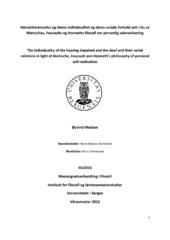Hørselshemmedes og døves individualitet og deres sosiale forhold sett i lys av Nietzsches, Foucaults og Honneths filosofi om personlig selvrealisering
Master thesis
Permanent lenke
https://hdl.handle.net/1956/5053Utgivelsesdato
2011-05-16Metadata
Vis full innførselSamlinger
- Department of Philosophy [240]
Sammendrag
The theme of my master thesis will be the interaction between the deaf and the hearing in a social context where the transition from a perspective of lack to a perspective of capacity will be an important factor. The Norwegian psychiatrist of the deaf Terje Basilier has come up with an interesting quote here from Dr. Silverman at Central Institute for the Deaf, St. Louis. Silverman says, according to Basilier that… “It is funny that we, when we want to do something for the deaf, immediately concentrate on the faculty of hearing which they do not have, instead of working with those senses which they do have, and the possibilities which lies in their use.” (My translation of Basilier 1964:6) What Dr. Silverman hints at here is that the fixation on the ear and a possible hearing rest in the deaf will lead to a perspective of lack which will have to have a restraining effect on their emotional, cognitive and social development, while working on their remaining senses and the possibilities which lie inherent in them will open up a perspective of capacity since sign language ability and functional bi-lingual ability gives possibility conditions for such a development. Here the focal point is moved from individual/biological pathology to interpersonal/social conditions, something which implies that “deafness” (as it is traditionally understood) can be viewed as a social pathology. This is, by the way, an area of experience which, according to its nature, can throw light on a central and common human problem related to communication, and demonstrate how self-understanding, the recognition/acknowledgement of differences, vulnerabilities and social status can serve to counteract infringement and repression throughout society. Communication is of paramount importance for gaining mutual recognition/ acknowledgement, and thereby autonomous personal self-realization, also for two or more speech- and action capable individuals of the same language. I have in this thesis chosen to concentrate mainly on Axel Honneth’s theory of recognition/acknowledgement, with its three forms love/friendship, justice and solidarity, and on how these, as forms of moral experience, are connected with abilities and characteristics, autonomous self-realization, infringement and so on. I will nonetheless open with a discussion of relevant ideas from Nietzsche and Foucault, ideas which are well suited to throw light on the problem at hand and, at the same time, ease the access to Honneth’s theory. My main questions will thus be as follows: 1. How can Nietzsche’s philosophy help throw light on the dilemma of the deaf and its solution, and in so doing also say something important about the necessity to realize a perspective of capacity for people generally? (Part 2) 2. How can Foucault’s ideas about the disciplinary society help throw light on the perspective of lack as experienced by the deaf in particular and ordinary people in general? (Part 3) 3. How can Honneth's theory of recognition/acknowledgement contribute to the understanding of «deafness» as a social pathology and to the understanding of «deafhood» as implied by the fight for recognition/acknowledgement? (Part 4) 4. How is it that the moral experience of infringement leads to a fight for recognition/ acknowledgement, and what does this fight consist of in the case of the deaf? Can Nietzsche’s and Foucault’s perspectives in some way enhance or lend weight to Honneth’s theory of recognition/acknowledgement? (Part 5) 5. How can Foucault’s project of enlightenment and culture of self-relation support Honneth’s ideas about mutual recognition/acknowledgement? (Part 6)
